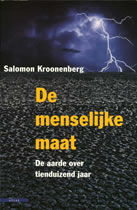Salomon Kroonenberg
The Human Scale (De menselijke maat)
The Earth Ten Thousand Years from Now
The Human Scale sparkles with erudite iconoclasm. Salomon Kroonenberg tackles such explosive issues as climate change, the greenhouse effect and rising sea levels both unconventionally and incisively. His tone and line of reasoning demonstrate his aversion to doom-mongering; in fact he fires a formidable salvo of arguments at fashionable alarmist forecasts that suggest the earth is heading for man-made catastrophe.
Kroonenberg takes the reader around the globe from the Caspian Sea (with its extreme changes in surface level) to the Columbian volcano Nevado del Ruiz, which spewed tons of mud over the small town of Armero in 1985, turning it into a necropolis. At the same time he produces chains of facts and correlations, which he binds together into a kind of geological Theory of Everything. He offers a surprisingly new and topical perspective by forcing the reader to look over the edge of a vast abyss of time, measured in billions of years.
Kroonenberg challenges politicians, scientists and other opinion makers to extend their models of the future, which often look ahead no more than a century, to at least the year 10,000. He wants them to measure events not only against a human scale but against that of the natural world.
This accessible, almost playful book enables the reader to take several steps back, like a painter working on a large canvas. Only then can we get a sense of the earth’s great geological cycles, such as the recurring ice ages. The author continues to surprise (if not provoke) with assertions like: why all the fuss about adding a bit more greenhouse gas to the atmosphere when we are already due for another ice age?
Professor Kroonenberg, known to his colleagues as ‘a poet among geologists’, scatters references to world literature throughout his intelligently composed marathon lecture. Far from being pretentious, this is a well considered way of raising the material above the grubbing around in the dirt which so limits many books on geology.
‘I want to show how insignificant humans are,’ Kroonenberg explains. ‘We are merely a tiny cog in the works, a factor that can be almost completely discounted.’ He achieves this aim to a truly remarkable degree. The Human Scale is a book that takes risks in its exploration of both social and scientific issues.
Publisher
Atlas
Herengracht 481
NL - 1017 BT Amsterdam
TEL. +31 20 524 98 00
FAX +31 20 627 68 51
E-mail: atlas@uitgeverijatlas.nl
Website: www.uitgeverijatlas.nl
Publishing details
De menselijke maat. De aarde over tienduizend jaar (2006, 334 pp, 85,000 words)
With illustrations and references
20,000 copies sold

Biography
Salomon Kroonenberg studied physical geography at the University of Amsterdam and completed his doctorate there in 1976. Between 1972 and 1982 he worked as a geologist in Surinam, Swaziland and Columbia before becoming Professor of Geology and Mineralogy at the Agricultural University of Wageningen. In 1996 he left Wageningen to become Professor of Applied Geology at the Technical University of Delft. Until recently Kroonenberg was a columnist for Intermediair. A collection of his columns was published as Stop the Continents! (1996). He is the author of The Human Scale (2006), which won him the Eureka Prize and has been translated into German, Chinese and Turkish.
Website: www.salomonkroonenberg.nl/
Quotes
“Salomon Kroonenberg brings abstract data to life in a highly accessible way.”
― NRC Handelsblad
“Thinking about his arguments really gets you somewhere. You can then enter the arena far better prepared than simply with the idea that all kinds of dreadful things are happening.”
― Trouw
Category
Genre: non-fiction
Translations
- Der lange Zyklus. Darmstadt: Primus, 2008
- On bin yıl sonra dünya. Istanbul: Kitap Yayinevi, 2010
- [Renlei chidu. Shanghai: Shanghai Literature and Arts Publishing House, 2011
- Continued...
Rights sold
- Alatoran (Bakoe, Azerbeidzjan)
- Continued...
